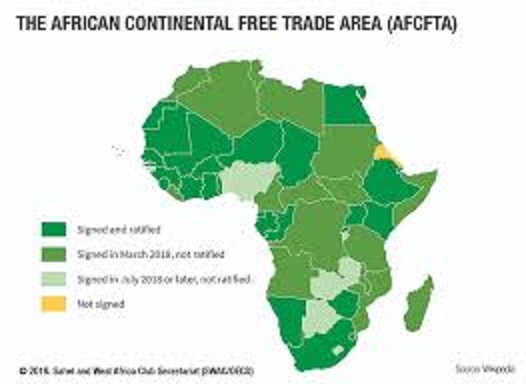The Central Bank of Nigeria (CBN) on Monday began preparing the Nigerian financial sector, through a Town Hall meeting, to take full advantage of the African Continental Free Trade Area (AfCFTA) Agreement.
The meeting, organised via a webinar, emphasised the need for the sector to reposition and play a key role in reaping the benefits provided in the agreement, Dr Kingsley Obiora, CBN’s Deputy Governor, Economic Policy Directorate, said.
Obiora assured that the CBN would provide the needed support to stakeholders in the country’s financial sector to ensure that optimal benefits were reaped from the AfCFTA agreement.
Amb. Yonov Agah, Director General, Nigerian Office of Trade Negotiations (NOTN), assured that his office would also work with all stakeholders in the area of negotiations, to facilitate maximisation of the agreement’s benefits.
“On the expectations of what needs to be done, if you have any issue with negotiations, we can work with you. You need to negotiate amongst yourselves first, before going continental. We will work with you and guide you to maximise the benefits,” he said.
According to Mr Haruna Mustafa, CBN’s Director, Banking Supervision Department, the banking sector was expected to play a pivotal role in the implementation of the AfCFTA agreement.
Haruna assured that Nigerian banks were well positioned to play that important role within a fast growing continental population.
“The African population is projected at 1.7 billion by 2030. This implies that intra-African trade will increase astronomically. The AfCFTA agreement will lift more than 30 million Africans out of poverty.
“The numbers mean a lot of opportunities for banks. The banks need to be well capitalised and as we speak the industry is well capitalised, ” he said.
He urged financial institutions to operate with the highest professional standards, to win the confidence of other stakeholders.
Mr Bello Hassan, Director, Other Financial Institutions (OFI) Department, cited Development Finance Institutions, Discount Houses, Finance Companies, Holding Companies, Merchant Banks and Micro-finance Banks, as engine rooms for economic growth.
“Some of the OFIs are already undergoing a recapitalisation drive to strengthen them to be more competitive,” he said.
He urged the OFIs to clean up their books, adopt International Financial Reporting Standards and improve their internal control systems.
“They should train their staff and rejig their business practices. They should continue to engage other stakeholders, and support small businesses to take full advantage of AfCFTA”, he said.
He added that with AfCFTA and the support of these financial institutions, Micro, Small and Medium Enterprises (MSMEs) would be enabled to produce goods and services for export.
“We expect an increase in trade in the continent and MSMEs should be able to produce goods and services for export”, Hassan stressed.
Dr. Ozoemena Nnaji, Director, CBN’s Trade and Exchange Department, however, said that a lot of bottlenecks needed to be removed for Nigeria to reap maximum benefits from the AfCFTA agreement.
In particular, she identified the need to address the issue of logistics at the existing ports of entry, as well as the opening up of additional ports to accommodate the volume of expected trans-continental trade.
“We should also look at attracting more foreign direct investment into critical sectors of the economy. We should improve on the manufacturing sector to boost economic diversification agenda.
“Nigeria is the second largest exporter on the African continent, accounting for about 19 per cent of all exports, we should, therefore, work to improve on that, ” she said.
Dr. Hassan Mahmoud, Director, Monetary Policy Department of the CBN, noted that the meeting was an avenue to brainstorm on ways to enhance the capacity of the financial sector to take full advantage of the AfCFTA agreements .
He assured of the resilience and the strength of the sector to take the lead in driving continental trade, through the agreement.




